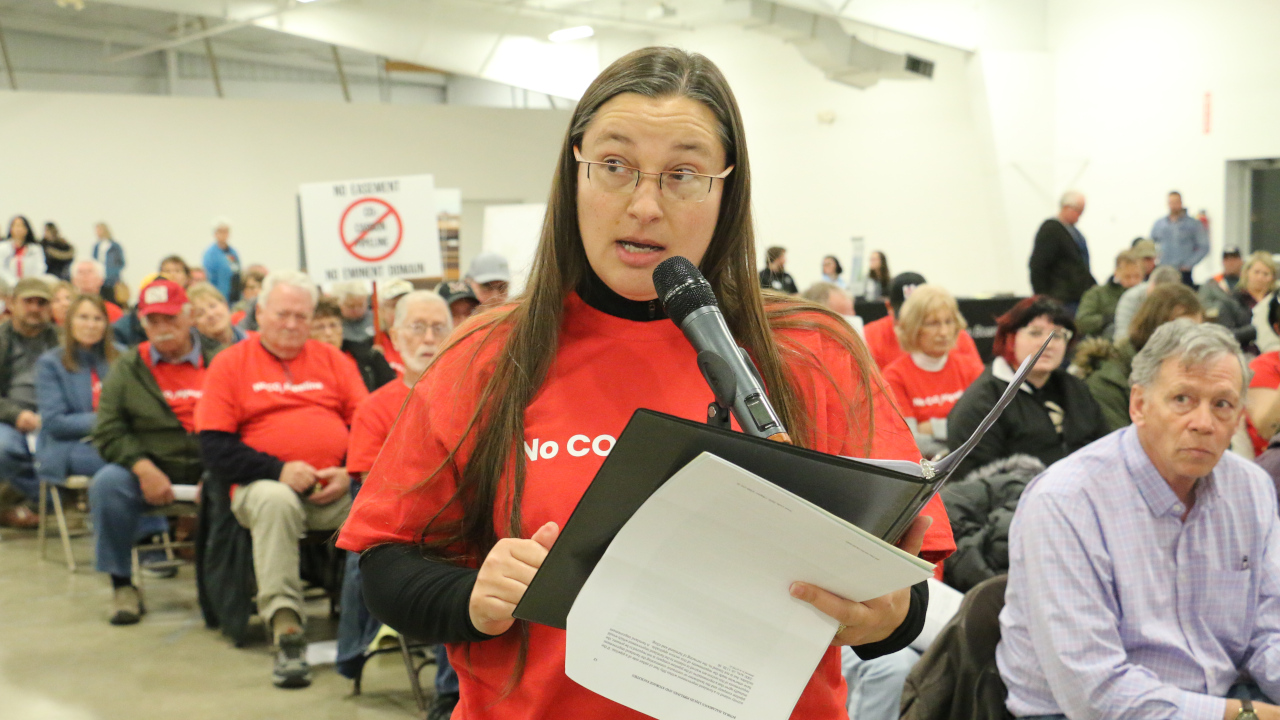Opposition was the order of the evening Dec. 5 as the Iowa Utilities Board hosted an informational meeting about a proposed liquid carbon dioxide hazardous material pipeline in southern Linn County. More precisely, opposition to the plan was virtually unanimous at the meeting. Of the two dozen speakers who voiced their views during Monday night’s […]
Opposition was the order of the evening Dec. 5 as the Iowa Utilities Board hosted an informational meeting about a proposed liquid carbon dioxide hazardous material pipeline in southern Linn County.
More precisely, opposition to the plan was virtually unanimous at the meeting.
Of the two dozen speakers who voiced their views during Monday night’s meeting at the Hawkeye Downs Expo Center, nearly all said they were against the proposal from Wolf Carbon Solutions. One speaker, Jessica Wiskus, said she didn’t feel Wolf Carbon officials, who outlined their project earlier in the meeting, respected the constitutional rights of Linn County landowners along the pipeline’s proposed route, who would be asked to grant voluntary easements for the pipeline project to proceed.
And without those easements, Ms. Wiskus said, Wolf Carbon would have to seek eminent domain proceedings for required land parcels.
“In Iowa, economic development is not sufficient for the granting of eminent domain,” Ms. Wiskus said, citing a 2018 Iowa Supreme Court case. “The court found that ‘trickle down benefits of economic development’ are not enough to constitute a public use.’ So all this talking about economic development, and the slides (you showed), are nothing but a dog and pony show, part of Wolf's attempt to control the narrative in the media. But they're not controlling us.”
To a round of applause from the audience, Ms. Wiskus encouraged county landowners not to sign easements for the project.
“All of us have been sitting here listening to Wolf (representatives) like a bunch of sheep, for over an hour,” she said. “I'm here to say I'm not a sheep, Wolf. You can't pull the wool over our eyes. The sheep are fighting back.”
As in
a previous informational meeting about the Wolf Carbon project in August, many of the comments Monday night focused on safety concerns, particularly how Wolf Carbon would respond to any potential leaks or explosions along the pipeline’s route.
For their part, Wolf Carbon officials said safety is a key aspect of their proposal, noting that a carbon capture pipeline near Alberta, Canada has been operating since June 2020 with no safety concerns thus far, and that the company employs strict standards in the design, installation and maintenance of its pipelines.
Wolf Carbon is
proposing a 280-mile liquid CO2 pipeline that would run through several Eastern Iowa counties, including the southeast portion of Linn County.
Under the proposal, Wolf would build the carbon sequestration pipeline between Cedar Rapids and Decatur, Illinois. The pipeline, referred to as the Mt. Simon Hub, would transport liquefied CO2 through a pressurized 16-inch pipeline from ADM plants in Cedar Rapids and Clinton to an ADM sequestration facility near Decatur, Illinois, where the gas would be pumped underground at the Mt. Simon Sandstone saline reservoir for permanent storage.
One of the speakers at the Dec. 5 meeting, Linn County supervisor Louie Zumbach, asked for guidance from IUB chair Geri Huser as to whether any action by the board of supervisors – including any potential ordinance to block the project – would withstand a legal challenge.
In response, Ms. Huser said that while she couldn’t take a former legal position, she said local officials could take any action they wish to protect the perceived interests of their constituents.
One Linn County action, already in the works, would impose mandatory setbacks from any hazardous material pipeline project. A vote on that project
was slated for the board’s Dec. 5 meeting, but was postponed a week after county officials learned Mr. Zumbach was unable to attend the meeting.
IUB officials stressed that any comments made at the Dec. 5 meeting would not be part of
the IUB’s official docket for the project, HLP-2022-0002. Comments must be filed in writing to the docket, either by mail or electronic submission.
By law, Wolf Carbon can file a formal petition with the IUB 30 days after the final public informational meeting about the project, currently set for Dec. 6. Under that guideline, the petition could be filed in early January, setting the formal project review process in motion.
